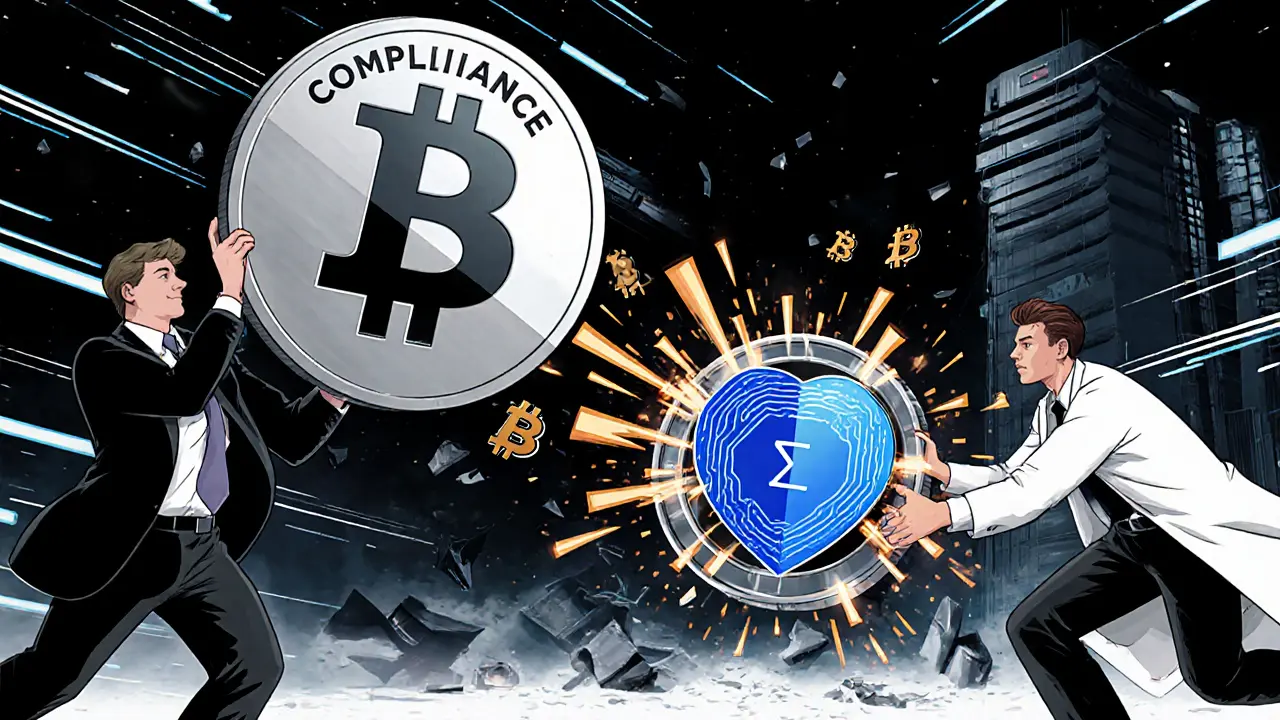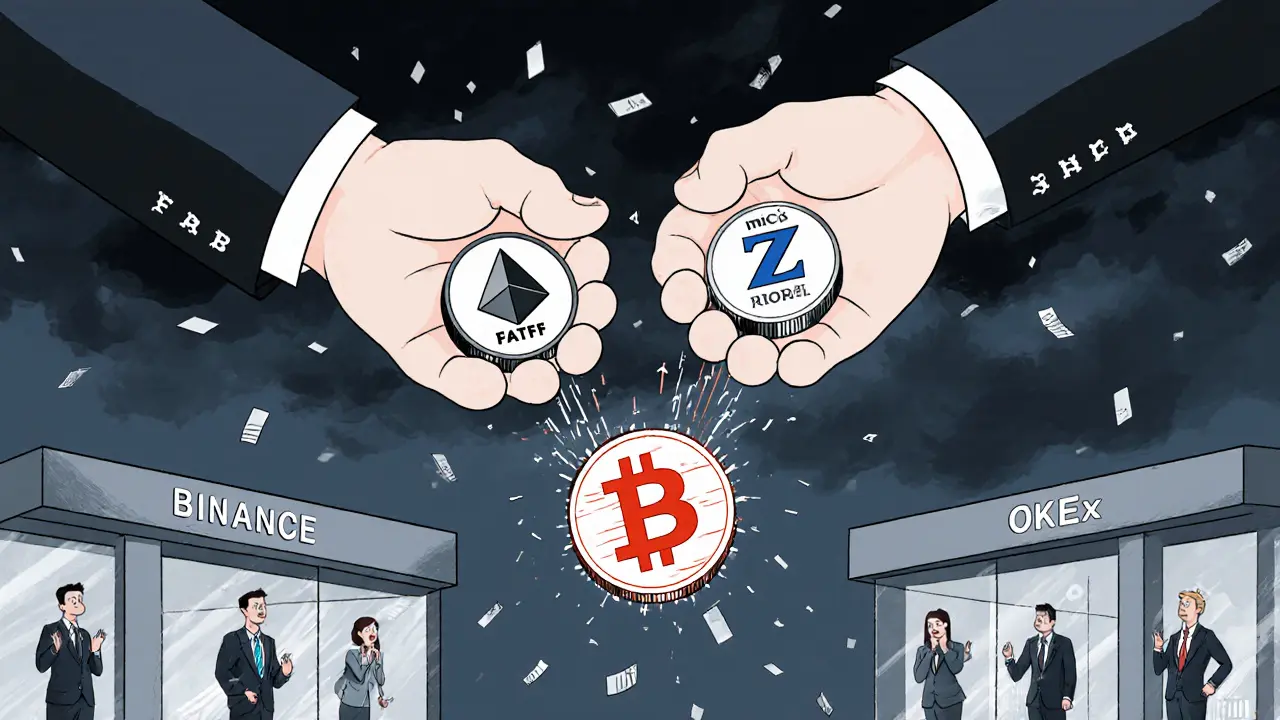Privacy coins are disappearing from major crypto exchanges - and it’s not a glitch. It’s a global regulatory purge.
In 2025, more than 73 exchanges around the world removed privacy-focused cryptocurrencies like Monero, Zcash, and Dash. That’s up from just 51 in 2023. This isn’t random. It’s a coordinated move driven by regulators, not market demand. If you held privacy coins on Binance, Kraken, Upbit, or OKEx Korea, you got a notice: “Your asset is being delisted. Withdraw by October 10.” No debate. No vote. Just gone.
Why now? Because regulators finally caught up. The Financial Action Task Force (FATF) updated its rules in June 2024, making it illegal for exchanges to support transactions that can’t be traced. Privacy coins, by design, break that rule. They hide who sent money, who received it, and how much was sent. That’s great if you’re a whistleblower in a dictatorship. It’s terrifying if you’re a bank inspector trying to stop drug cartels or terrorist financiers.
How privacy coins work - and why regulators hate them
Unlike Bitcoin, where every transaction is visible on a public ledger, privacy coins use advanced cryptography to erase digital footprints.
- Monero (XMR) uses ring signatures to mix your transaction with dozens of others, making it impossible to tell which one is yours.
- Zcash (ZEC) offers shielded transactions with zero-knowledge proofs - you can prove a payment happened without showing any details.
- Dash (DASH) uses PrivateSend to mix coins through multiple nodes, obfuscating the trail.
These aren’t theoretical features. They’re real, battle-tested tools. But under the FATF’s 2025 Travel Rule, exchanges must collect and share customer data for transactions over $1,000. Privacy coins make that impossible. You can’t report who sent $5,000 in Monero if you don’t know who sent it.
That’s why the European Union’s MiCA regulation forced a 22% drop in privacy coin listings across its member states. Japan banned them entirely in 2018 and doubled down in 2025. South Korea’s top five exchanges removed six privacy coins in Q1 2025. Kraken pulled them from Canada. Binance cut them from U.S. and EU platforms - wiping out an estimated $600 million in monthly trading volume.
Who’s still letting privacy coins trade?
Not many.
Switzerland and Liechtenstein still allow limited trading under strict KYC rules. Singapore permits them with enhanced monitoring. But even those are exceptions. The EU plans a full ban on anonymous crypto accounts by July 2027. Australia restricts access. Dubai banned them in 2023. The global trend is clear: if you can’t prove who’s sending money, you’re not welcome on regulated exchanges.
That’s created a geographic patchwork. If you’re in Tokyo, you can’t buy Monero legally. If you’re in Zurich, you can - but only after submitting your passport, utility bill, and bank statement. And if you’re in the U.S.? Forget it. Most major platforms won’t touch them.

Market paradox: Prices are rising even as access shrinks
Here’s the twist: despite all the delistings, privacy coins surged 71.6% in value during 2025. Monero and Zcash outperformed Bitcoin. Why?
Supply and demand. With fewer exchanges listing them, the available supply on regulated platforms dropped. But demand didn’t disappear - it just moved. People who still want privacy aren’t giving up. They’re going elsewhere.
LocalMonero, a peer-to-peer platform, saw a 19% spike in activity after centralized exchanges pulled the plug. Users are turning to decentralized exchanges (DEXs), atomic swaps, and over-the-counter (OTC) brokers. Institutional investors, according to CoinLaw, are quietly increasing their holdings - betting that privacy will remain a core feature even if mainstream exchanges won’t support it.
Zcash’s shielded addresses dropped 8% due to KYC pressure, but overall usage hasn’t collapsed. It’s shifting - from exchanges to dark channels, from retail to private wallets.
What users are doing now
Reddit threads are full of panic. Twitter is full of outrage. But action? That’s where it’s happening.
- Users are withdrawing privacy coins before delisting deadlines - often holding them in hardware wallets like Ledger or Trezor.
- Many are switching to non-custodial platforms like Bisq or Hodl Hodl, where you control your keys and no one asks for ID.
- Some are using privacy-focused DeFi protocols that don’t require KYC, like Tornado Cash (though that’s also under legal pressure).
- A growing number are learning how to run their own nodes to verify transactions without relying on third parties.
There’s a clear split in the community. One side says: “Regulation is inevitable. We need to comply to bring crypto to the mainstream.” The other says: “This isn’t regulation - it’s censorship. Cryptocurrency was built to protect financial privacy. If we give that up, what’s the point?”

The future: Can privacy coins survive?
They’re not dead. They’re evolving.
Developers are working on hybrid models - privacy with compliance. Imagine a Zcash transaction that’s fully shielded… but allows a government-approved auditor to view details under a court order. That’s the goal. Zero-knowledge proofs could be tweaked to prove compliance without revealing data.
Seventy-four percent of privacy coin developers say FATF rules are their biggest challenge. But they’re not giving up. Some are building “selective transparency” into new coins - where users can choose to reveal transaction details only when legally required.
Will it work? Maybe. But it’s a race against time. Regulators aren’t waiting. Exchanges aren’t waiting. The window for privacy coins to adapt without losing their core identity is closing.
For now, if you want to trade privacy coins, you’ll need to go off-exchange. You’ll need to understand self-custody. You’ll need to accept that you’re operating outside the mainstream - and that comes with risks. No chargebacks. No customer support. No safety net.
But if you believe financial privacy is a right - not a bug - then you’re not alone. And you’re not out of options. You’re just in a different game now.
What happens next?
Expect more delistings in 2026. More lawsuits. More regulatory pressure on DeFi platforms. More countries joining the ban.
But also expect more innovation. More privacy-focused wallets. More decentralized infrastructure. More users learning how to protect their data without relying on exchanges.
The battle isn’t over. It’s just moved underground.
Why are privacy coins being removed from exchanges?
Privacy coins like Monero and Zcash are being delisted because they make it impossible for exchanges to comply with global anti-money laundering (AML) rules. Regulators, especially under FATF guidelines, require exchanges to track the origin and destination of funds. Privacy coins hide this information using ring signatures, zero-knowledge proofs, and stealth addresses - making them non-compliant by design.
Can I still buy Monero or Zcash after they’re delisted?
Yes, but not on major exchanges like Binance or Kraken. You can still buy them on peer-to-peer platforms like LocalMonero, decentralized exchanges (DEXs) like Bisq, or through OTC brokers. These platforms don’t require KYC, but they come with higher risks - no chargebacks, no customer service, and no insurance.
Are privacy coins illegal?
No, privacy coins themselves are not illegal in most countries. But using them on regulated exchanges is banned in places like Japan, South Korea, and soon the entire EU. Owning or trading them privately is still legal in many jurisdictions - but you’re operating in a legal gray zone with no protection.
Why did privacy coin prices go up even as they got delisted?
Fewer exchanges mean less supply on regulated platforms, but demand didn’t disappear - it just moved. People who value privacy still want these coins. They’re holding them, trading them off-exchange, and institutional investors are quietly accumulating. Reduced liquidity on big platforms can drive up prices, especially in a bull market.
What’s the future of privacy coins?
The future depends on whether developers can build privacy features that also satisfy regulators. New projects are experimenting with “selective transparency” - where users can prove compliance without revealing full transaction details. If they succeed, privacy coins might return to exchanges. If not, they’ll remain on the fringes - used by those who prioritize anonymity over convenience.

9 Comments
Honestly? I'm not sad to see them go. If you're using crypto to hide money from the law, that's not freedom, that's fraud. We need clean systems, not ghost transactions.
I get why regulators are scared but man i miss the days when crypto felt like a real alternative not just another bank with extra steps
Delisting privacy coins is just state control creep. They dont want you to own anything they cant track. This is the slippery slope to financial serfdom
You people act like this is some kind of civil rights violation. Privacy coins are used by drug lords and ransomware gangs. If you cant prove your money isnt dirty then you dont deserve to trade on regulated platforms. End of story.
I understand the fear... really I do... but I also think about how many people in authoritarian countries rely on these coins to send money to family, to avoid surveillance, to survive... and now they're being punished because the system can't handle complexity... and it breaks my heart... because privacy isn't a bug... it's a feature of human dignity... and we're removing it because it's inconvenient...
i think people are missing the point here... its not about banning privacy... its about making sure the system doesnt get abused... i mean sure you can still use monero on bisq or otc... but now you know why its not on binance... its not because they hate you... its because they cant afford the legal risk... and honestly... if you really care about privacy... you should be running your own node anyway... not relying on some exchange to hold your keys... its like trusting a hotel with your diary
The fact that prices went up 70% proves people still want this. Regulation can't kill demand. It just pushes it underground
you know what's funny... they say privacy coins are for criminals... but the real criminals? the ones running the exchanges... the ones collecting your data... selling it... letting governments spy... and now they're the ones deciding what's 'legal'... who's really the threat here?
They're coming for your crypto next... just wait... the same regulators who banned privacy coins are already drafting laws to track NFTs and DeFi wallets... they're building a digital panopticon... and you're all just clicking 'agree'... one day you'll wake up and your wallet will be frozen because you bought a cat meme that 'looked suspicious'... they already have the tech... they just need the excuse... and they're using privacy coins as the perfect scapegoat... dont be fooled... this is about control... not crime